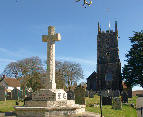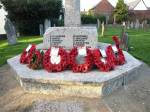In continuation of a series of articles to commemorate the anniversary of the First World War, we look at the education of the Winkleigh children who were destined for the conflict, some to die, some to be wounded, and many to survive.
Most of the generation were fortunate that the 1902 Education Act would change schooling in this country forever, removing from the School Board most of its powers over the original Winkleigh School, which were now handed to the Devon County Council. At first, however, the changes would hardly be noticed in Winkleigh or Hollacombe, where all the usual staffing and management problems continued as normal. On the 29th September 1903 the Devon County Council finally took over from the Winkleigh School Board, with the Board members now renamed ‘Managers’, and with greatly reduced powers. The Headmaster, Mr. Dupere was given a welcome bonus of £3.6.8 (to save it being passed to the County Authority), the school properties were handed over to the County Council, and with the control of the school no longer in the hands of the local worthies a whole era was at an end.
The attendances improved up to 103 on a roll of 130. Dupere certainly brought fresh ideas. He began system of marking early pupils in red, late in black. Red marks throughout the week qualified for leaving at 4.0 o’clock on Friday afternoon. In the first week 11 girls and 16 boys had their names displayed on a board of honour. By Feb 1901 34 children were obtaining ‘early marks’. By March it was 39 and attendances among the waverers greatly improved. Some 52 children, however, well over a third of the roll, were still more or less permanently non-attending. Most of these parents attended a special meeting to which they were summoned, following which there was marginal improvement. Attendance cards were initiated as a further incentive to the children which qualified for special rewards. In the first week 85 children were neither absent nor late. Names of defaulters were written on a special board: the ‘black list’. On 7th March 1902 to celebrate the opening of the school year, illuminated certificates were presented to 9 girls and 2 boys as a reward for being ‘never absent, never late’ the whole previous year. A special mention was made of Nellie Brook was missed her certificate by being one minute late on a single day! Of the two boys, Christian Miller was the son of Josiah Miller, farmer at Grey’s Bridge. He was only 5 years old and must have been immensely proud of his achievement. He had an exotic war, serving in the Imperial Camel Corps which he joined with his older brother Leonard in Australia, far from the green hills of North Devon. The other was Percy Mitchell, then aged 7, son of the blacksmith at Westacotts. This was a family who gave as much as any to the war, but all survived. Percy served in the 6th Battalion of the Devons, but sadly he died in October 1921 aged 29, as a result of his experiences. William, aged 24 in 1914 joined the Royal Engineers. Richard George, a year younger enlisted immediately into the Royal Navy and joined the sailing ship HMS Impregnable and eventually served on the famous HMS Warspite, a ‘Dreadnought’. Of the two youngest boys, Henry joined his brother Percy in the 6th Battalion Devons, and Arthur the Royal Army Service Corps. No other family in Winkleigh could equal this record, of which the village was, I am sure, justifiably very proud.
Attendances continued to have its ups and downs - by December 1902 Mr. Dupere was still writing: ‘Attendance in this District exists only in name’. The new Education Act of 1902 could not be implemented immediately by Devon County Council, but when it was improvement was rapid. In 1903 perfect attendance was rewarded with certificates to 17 girls and 5 boys. These were Christian and Leonard Miller (of future Camel Corps fame), Percy Mitchell again and his brother William, and Albert Stapleton (who died training in 1914, Winkleigh’s second casualty). As an added example to others, and no doubt a great source of pride and excitement these 22 children were photographed and a copy was displayed in the school. The new County Authority included a regular oversight by the County Attendance Officer, who controlled a number of attendance officers. The effect on Winkleigh was quite magical, and for the first time in the history of the school the Headmaster could at last count on a virtual 100% attendance of his pupils. The ‘war generation’ were indeed fortunate that the 1902 reforms came just in time to afford these children a much improved educational experience to those that had gone before. The Attendance hierarchy assisted too with reporting to the County on the physical state of the building, commanding the Managers (the remnant of the old School Board) to put things right. Suddenly the surface of the playground was repaired, a new supply of coat pegs graced the entrance lobby, broken desks were thrown out and replaced, and supplies ordered were actually delivered. Everyone’s morale rose accordingly, and at last Winkleigh could have a school of which it could be proud. Even the annual summer intake of gypsy children could benefit. The log records in 1909: ‘There was a good attendance including 3 children of the gypsies camping in the parish. These gypsy children are very ignorant but they have been very regular in coming to the school and have behaved remarkably well.’ Only the outbreak of war in August 1914 which threw the village into turmoil disturbed the even tenor of life at the school.
The children destined to be those on whom would fall the burdens of the First World War were for the most part attending the school at the time of the great change brought by the 1902 Education Act. We are fortunate that Mr. Dupere was careful to record the names of the children, among them on April 25th 1900 William Bissett, aged 5. His father, William, was the groom and gardener at Winkleigh Court with an only child and living in a 4 room cottage on the estate. Young William would serve in the Royal Engineers. On his return from the war he took a great interest in the life of Winkleigh and is mentioned in the Parish records as contributing 2/6d towards the new church bells fund. Percy Beardon, son of the Hollacombe wheelwright, and who had been at Hollocombe school, moved down to Winkleigh as a 13 year old to move into a higher Standard having taken and passed the Standard 4 exam. He was to serve in the Royal Artillery, with a tragic death by drowning in October 1918. He stayed at Winkleigh School for a year before taking his first job as a ‘servant’, probably with the horses, on William Cowle’s farm at Wood Terrale. In May 1900 Ernest Western arrived, aged 13. A year later he was looking after the cattle working for John Shepland on Ward Farm. Ernest was a farmer’s son at Staple Green Farm, and the family had moved into Winkleigh from Asreigney. He served in the 1st North Devon Yeomanry in Gallipoli with his friend Frederick William Davey who was killed there on 8th November 1915. In May Albert Mitchell aged 5, joined the school. The son of the carpenter in Park Place, he was to serve in the Devons. Claud Francis was only 4 when he first came to school in 1900. He stayed at school a long time, leaving over age at 16 in 1912 to work for the Post Office. He was 18 in 1914 and served in the navy on ‘HMS Griffin’. His brother Cecil also left school over age at 15, was 17 in 1914 and served later in the Devons. Claude and Cecil were the sons of Henry Francis, carpenter and joiner in Castle Street. A widower, the children were cared for by his sister-in-law who had come up from St. Mellion in Cornwall.
The generation of 18 year olds in 1914 was born in 1896 and would have started school aged five in 1901, taught by Mrs. Tipper, under the Mastership of Mr. Dupere. Those older would have known both Mr. and Mrs. Tipper. Herbert Lugg, for example, 35 in 1914, and destined to die in Mesopotamia, was the oldest Winkleigh casualty. Born in 1879 he would have first started in the infants’ class in 1884. It is fascinating to know more of the day to day details of what it must have been like to have attended Winkleigh School in those days, and how the lives of these children developed. School life, of course, was closely entwined with home. A hundred years ago the social classes were generally divided between the gentry, living in Higher Town, the Square, and Barnstaple Street, with the artisan classes living below the church in Church Hill and the Exeter road, and the labouring class in Lowertown. However, all but the gentry class of children were brought together in the school and some of the more rigid barriers between them must have begun to fade. All were subjected to the same rules, the same curriculum and the same treatment whether their fathers were the masters or the labourers, the shopkeepers or the artisans.
Blessed by the heroic efforts of three outstanding Headmasters, first Mr. Tipper and Mr. Dupere, and then after a rather more dismal two years from 1904-6, Mr. John Lane (1906-1922) we can conclude that the Winkleigh generation of ‘war children’ received as good an education as any that could be supplied by the State, certainly for those parents who could see the benefits. When war came, we can see that the education of the masses of the nation’s young men enabled their government to persuade the very best to enlist immediately for ‘king and country’. This was certainly the case in Winkleigh. Others, and of course those reaching military age during the war, were conscripted from 1916 onwards. We can be confident that the bonds this exceptional generation of young men, bound together in the close proximity of the village where social distinctions, if they mattered at all to them, mattered not too much, and which enabled them to preserve their sense of humour, comradeship such as could never be experienced in any other way of life or death and a toleration for the bungles, the absurdities and the tyrannies that their war service would impose upon them.


